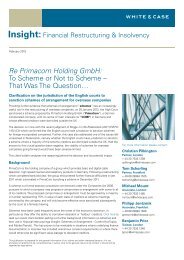Mexican Legal Framework of Business Insolvency - White & Case
Mexican Legal Framework of Business Insolvency - White & Case
Mexican Legal Framework of Business Insolvency - White & Case
You also want an ePaper? Increase the reach of your titles
YUMPU automatically turns print PDFs into web optimized ePapers that Google loves.
PART V<br />
Sundry Corporate and Other<br />
Law Issues<br />
This part <strong>of</strong> the book addresses in a general manner specific topics relating to sundry<br />
corporate and other legal issues arising in the context <strong>of</strong> insolvency.<br />
31. Director Liability 77<br />
There are two time frames relevant to the analysis <strong>of</strong> director liability in the context <strong>of</strong><br />
insolvency: (1) in the vicinity <strong>of</strong> insolvency; and (2) during insolvency.<br />
110<br />
a. In the Vicinity <strong>of</strong> <strong>Insolvency</strong><br />
In the absence <strong>of</strong> an illicit action, directors <strong>of</strong> a debtor are not liable to creditors outside<br />
<strong>of</strong> insolvency. 78 Mexico does not recognize the concept <strong>of</strong> the vicinity <strong>of</strong> insolvency (the<br />
“twilight zone” or the “zone <strong>of</strong> insolvency”), so doctrines <strong>of</strong> wrongful trading are also<br />
not recognized.<br />
The only case remotely connected with wrongful trading consists <strong>of</strong> a concept in<br />
the General Law <strong>of</strong> Commercial Companies under which, among other cases, the<br />
loss <strong>of</strong> two-thirds <strong>of</strong> the equity capital <strong>of</strong> a commercial company gives grounds for<br />
dissolution <strong>of</strong> the company. Should the company enter into new transactions once a<br />
case <strong>of</strong> dissolution has been recognized, the directors <strong>of</strong> the company shall be jointly<br />
and severally liable for the obligations <strong>of</strong> a company under those post-recognition<br />
transactions [LGSM 229-V, 233].<br />
Only the shareholders’ meeting <strong>of</strong> the company in question is entitled to “recognize”<br />
that the case <strong>of</strong> dissolution has occurred. The rationale behind this is expressed in the<br />
LGSM Bill, which provides:<br />
The dissolution <strong>of</strong> companies, according to guidance from treatises, is regulated in a different<br />
manner when it is produced ipso facto by the expiration <strong>of</strong> its term, and when it is the result<br />
<strong>of</strong> a partner decision or the recognition by the company’s corporate bodies that another <strong>of</strong> the<br />
77 This section does not address issues concerning director liability (1) with the debtor; (2) with creditors for matters<br />
unrelated to insolvency; or (3) for criminal actions.<br />
78 Cfr. Galindo (1957), pp. 170-203.
















